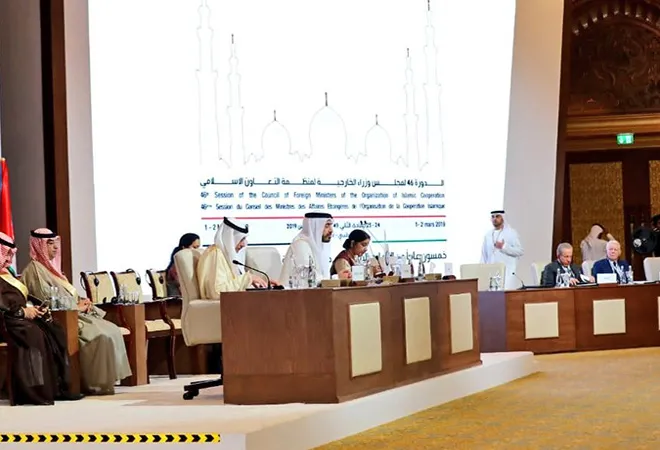How are we to judge the invitation to be the guest of honour at the recent plenary of the Organisation of Islamic Cooperation (OIC) Council of Foreign Ministers (CFM) summit, held in Abu Dhabi on 1-2 March?
What the OIC says and does, matters little. But in today’s information age, its positions shape perceptions, which, in turn, influence policy. So, we got an invite that we have thirsted for since we were ignominiously from the OIC’s Rabat Summit in 1969, there were no critical references to India in the Abu Dhabi Declaration, but it passed a separate resolution criticising India. And Pakistan boycotted the meet because of the Indian invite.
It’s not quite the unalloyed triumph for India as is being made out in official circles, but it is an important development with portents for the future.
OIC Invite Result of Modi-Prince Bonhomie
Our invite to the OIC CFM meet was probably courtesy the Crown Prince of Abu Dhabi, Mohammed bin Zayed al Nahyan, (the de facto ruler of UAE) who drives his country’s foreign policy. Prime Minister Modi has established a special rapport with the Crown Prince following his visit to UAE in August 2015 and then again in 2018.
In turn, there have been two visits by the Crown Prince to India in the tenure of the Modi government, the second as Chief Guest of the Republic Day parade in January 2017.
The Abu Dhabi Investment Authority has put $ 1 billion into HDFC’s affordable housing scheme and another $ 1 billion in India’s National Investment and Infrastructure Fund, and the Abu Dhabi National Oil Company and the Saudi giant ARAMCO have agreed to take a 50 percent stake in a $ 44 billion refinery being built in Ratnagiri district of Maharashtra. All this in the last year or so.
No doubt the Sheikh would have had the issue cleared with Saudi Arabia, the headquarters country of the OIC. Here again, Modi’s diplomacy has done good work as was evidenced by Crown Prince Mohammed bin Salman (MBS) visit to New Delhi last month.
So, it was no surprise that the Abu Dhabi Declaration adopted at the end of the meeting failed to mention Jammu & Kashmir, though, for the record, it did mention the other hot-button Islamic issue, Palestine, was critical of that Islamist outsider, Iran and was supportive of Syria and the UAE-Saudi policy in Yemen and critical of the Houthi militia.
It indirectly commented on Islamic State radicalism calling for “the necessity to stabilise the situation” stabilisation of Southeast Asia and Central Asia, and in the Middle-East and North Africa as well as other areas of the Africa continent. And for good measure it emphasised the need to restore permanent peace and stability in Afghanistan.
But while Imran Khan was praised for returning the Indian pilot “as a gesture of goodwill to de-escalate tensions in the region,” there was no condemnation of India’s actions in Kashmir in the Declaration. There were two objections to the final document of the Declaration—Iran and Pakistan.
Subsequently, a resolution was passed expressing “unwavering support for the Kashmiri people in their just cause” and condemning the recent waves of Indian “terrorism”. The resolution criticised the human rights excesses of the Indian forces and called for the implementation of the UNSC resolutions on Kashmir.
Another resolution on regional peace and security in South Asia welcomes Imran Khan’s renewed offer of dialogue with India and his gesture in handing over the Indian pilot. It expressed concern over air strikes by India on the terror camps in Pakistan.
Acceptance of Invite a Compulsion of Statecraft
For a party that has little concern or sympathy or concern for the Indian Muslims, it is indeed somewhat ironic that the BJP-led government even accepted an invite at the CFM meet of an organisation that calls itself the “collective voice of the Muslim world.” The reason is, of course, the compulsions of statecraft.
The 57-nation strong Organisation of Islamic Cooperation are too large a bloc of countries to ignore.
Further, by refusing the invite, Islamabad would have got a free pass that it has had since the Rabat fiasco when an Indian delegation led by Fakhruddin Ali Ahmed, later President of the country led an official Indian delegation to the Moroccan city, only to be kept out of the meetings at the insistence of Pakistan.
As a result, Islamabad has routinely used the summit as a platform for anti-Indian propaganda. Almost every summit has a de rigeur criticism of Indian actions in Jammu & Kashmir. There is an OIC Contact Group on Jammu & Kashmir which regularly passes resolutions criticising India.
Immediately after the Balakot strike on 26 February, for example, the OIC Contract group met in Jeddah and called for immediate de-escalation. India was roundly condemned at the meeting for “the recent wave of repression, brutal killing of innocent Kashmiri civilians by the Indian occupied forces, frequent incidents of rapes especially of minor girls.” The OIC also formally condemned “India’s violation of the Line of Control” with Pakistan, an OIC founding member state.
Like the cross-border air strike, the OIC invite has portents for the future. It marks a successful breaching of the OIC solidarity by New Delhi. Whether or not it remains a one-off affair depends as much on South Block’s diplomacy, as India’s ability to convince the world of its case in Kashmir.
This commentary originally appeared in The Quint.
The views expressed above belong to the author(s). ORF research and analyses now available on Telegram! Click here to access our curated content — blogs, longforms and interviews.




 PREV
PREV


